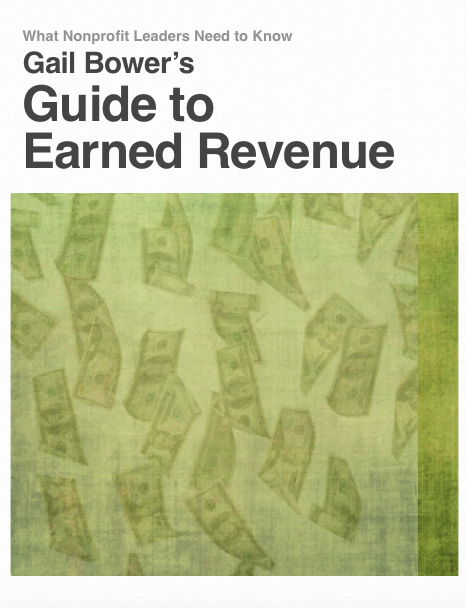Q&A with Nonprofit Attorney Morgen Cheshire
 Morgen Cheshire, Founding Attorney, Cheshire Law GroupIn a recent survey of nonprofit leaders about earned revenue, 17 percent said understanding the risks and legal issues was important to them. To clear up confusion and provide insights, I turned to my friend and colleague, nonprofit attorney Morgen Cheshire and founder of Cheshire Law Group in Philadelphia to guide us.
Morgen Cheshire, Founding Attorney, Cheshire Law GroupIn a recent survey of nonprofit leaders about earned revenue, 17 percent said understanding the risks and legal issues was important to them. To clear up confusion and provide insights, I turned to my friend and colleague, nonprofit attorney Morgen Cheshire and founder of Cheshire Law Group in Philadelphia to guide us.
While Morgen has provided great information, as you’ll see below, this short Q&A, which is part of a new Guide on Earned Revenue, is no substitute for legal advice by your organization’s counsel. This brief article is a guide only; please turn to your general counsel or call Morgen directly to answer your specific questions.
First, are nonprofit organizations allowed to generate earned revenue?
Absolutely. But there are a few rules. For example, nonprofits may have to pay tax on the income they generate, and the commerciality doctrine is designed to prevent nonprofits from directly competing with for-profits in the marketplace. Bottom line is that a nonprofit organization could lose its tax-exempt status if it conducts a commercial enterprise that is carried on simply to generate revenue and that does not carry out a charitable purpose aligned with the organization’s exempt purpose. The commerciality doctrine has been developed by the courts and has not been discussed in the sector as often as unrelated business income tax, but it is increasingly of more concern to nonprofits launching social enterprises. With creativity and careful planning, though, these issues can often be easily avoided.
Are there limits to how much they can generate?
No, unless the activity generating the income is unrelated to the mission of the organization. Earning too much income from unrelated activities can jeopardize an organization’s 501(c)(3) tax-exempt status. There is no bright line test, but the percentage threshold is low (5% or less to be on the safe side).
Your legal practice focuses on nonprofit organizations. What’s the biggest mistake you see when it comes to earned revenue, and how do you help clients mitigate those problems?
One big mistake nonprofits make when structuring corporate sponsorship arrangements is that they give so many benefits to sponsors that they trigger tax implications, converting sponsorship payments into earned income that is taxable. It catches many organizations by surprise. Another is that nonprofits don’t often push for details in collaborative or donor relationships, or take the time to document arrangements in writing as thoroughly as they should. This can create misunderstandings and lead to conflict, and can also raise compliance issues. Our role as general counsel? We ask a lot of questions, help to identify potential tax and legal issues, and document all arrangements in writing. If organizations are thinking systemically, working with counsel builds better institutional habits that pay forward and helps maximize an organization’s return on its fundraising efforts.
What is UBIT and what do nonprofit CEOs need to know about it?
UBIT is a tax — the unrelated business income tax — that even tax-exempt organizations have to be aware of. It is a tax on income that is derived from an activity that is regularly carried on and that is not related to the mission of the organization. Organizations often think that if revenue goes to support the mission, it cannot be unrelated or subject to tax, but that’s not the test. The test looks instead to the income-generating activity itself and not to how the income is spent. Whenever developing a new revenue generation strategy, CEOs need to ask legal counsel two important questions:
- Will this strategy trigger UBIT? and
- What other legal considerations should I be thinking about?
How does UBIT pertain to corporate sponsorship, a form of earned revenue?
If your nonprofit is giving a sponsor more than 2% of the value of the total sponsorship benefits received in exchange for the sponsorship, your nonprofit may be generating income that could be subject to tax.
When would a nonprofit organization consult with an attorney, such as yourself, when developing a strategy for earned revenue sources?
Always. We see things and can almost always add value.
What’s the biggest advantage of earned revenue for organizations?
Money and new relationships. They give organizations options and new opportunities. If earned revenue helps diversify income, and can add stability, that’s another big plus.
 Gail Bower's Guide to Earned Revenue
Gail Bower's Guide to Earned Revenue
To learn more about earned revenue — what it is, how to generate it, tax issues, and Morgen's suggestions on legal issues — please download Gail Bower's new Guide to Earned Revenue.
Morgen Cheshire has dedicated her legal career to serving nonprofits. She is a systemic thinker, able to see big-picture legal issues and holistically resolve them. From burgeoning start-ups to large national nonprofits, she blends her unique legal expertise and business savvy to help organizations make informed decisions. She was formerly a partner at a national law firm headquartered in Philadelphia, where she co-chaired the firm’s Nonprofit Practice Group. She founded Cheshire Law Group in July 2011.